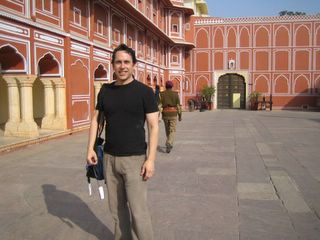A friend of mine recently asked, “How can a cycle-rickshaw driver in India be happy?”
This question was not a hypothetical one. This person had recently traveled to India. One detail that struck him most was his interaction with a cycle-rickshaw driver in Varanasi. My friend told a joke, and the driver—scrawny, prematurely aged and extremely poor—burst into a wide, authentic smile.
Was the rickshaw driver a happy person, despite a life of grinding poverty? I have no idea. But he made me think.
“The question isn’t how can Indians be happy,” I said. “It’s how can Americans be so unhappy.”
We looked around at the breakfast crowd at Balthazar—surely a place of “making it,” New York-style. The patrons sure looked busy, but they didn’t seem all that happy. Shouldn’t we be a whole lot happier, given how much better off we are than most of the world?
All of which brings me to a book I recently read, Are You Ready to Succeed, by Srikumar S. Rao. He analyzes why people are so unhappy with their jobs and lives in the U.S., and what they can do to change things.
Rao’s book is based on a popular course he’s taught for the past decade at Columbia business school. Whereas most books that dare to use variants of the word “success” in their titles focus on mastering the external world, Rao’s book is all about mastering yourself. He rejects the core Western belief that achieving more of something (more money, more recognition, more free time, more skinniness) will make you happy. Instead, his goal is to help you transform your life by dealing with your biggest impediment to happiness—you!
If I can boil Rao’s prescriptions down to two basic elements, they are: (1) mastering your own mind, and (2) accepting the idea that the universe is a cooperating, positive force rather than an indifferent or antagonistic one. The book argues that one’s perception of reality is merely a construct and that it’s possible to change this construct, for positive results. Many of the exercises in the book aim to help the reader master his or her mind, by reexamining our stories about how our life actually works, overcoming negative chatter, surrounding to reality rather than fighting it, and so forth. Ironically, it’s by achieving self-mastery that we finally are able to achieve what we want in life.
Rao establishes up front that all of his insights have come from other, greater teachers. His book is consistent with principles of acceptance and detachment found in Taoism and Buddhism, as well as the teachings of numerous Christian, Muslim, Jewish and nonreligious sages over the centuries. As I read the book, I was reminded of a number of other influential works, including The Artist’s Way (Julia Cameron), The Power of Now (Eckhardt Tolle), Wishcraft (Barbara Sher), Finding Flow (Mihalyi Csikszentmihalyi) and Authentic Happiness (Martin Seligman).
What Rao contributes to this literature is a coherent definition for what personal mastery actually is, and a coherent plan for achieving it. Hence, I’m reading it for the second time, and this go-round actually doing all the exercises!
Rao is clearly focused on an educated, professional audience, the types who are likely to be skeptical of books like this and therefore the ones in most desperate need of their teachings. I recommend it. If you’ve ever wondered why, no matter how you try, you always seem to fall short of “making it” in a way that is personally meaningful, this book offers plausible explanations and workable solutions.
skip to main |
skip to sidebar

